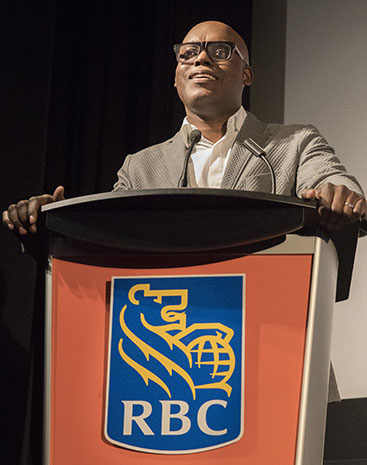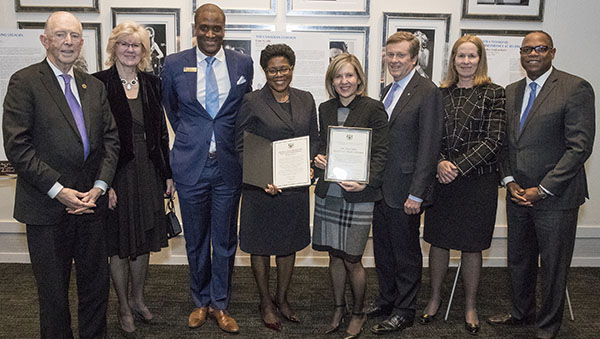By Neil Armstrong
PRIDE Contributing Writer
TORONTO, Ontario Tuesday, February 28, 2017 — Thirty Grade 12 students across the country have been presented scholarships, ranging from $500 to $5,000, by Canada’s largest bank, Royal Bank of Canada (RBC), in its 2017 Black History Month Student Essay Competition.
The bank held its Black History Month Celebration with a cocktail reception, announcement of the winners, and screening of the Golden Globe Best Motion Picture, “Moonlight”, at the TIFF Bell Lightbox in Toronto on February 16.

Kharissa Edwards, the first place winner in the RBC Black History Month Essay Contest, reads from her winning essay. Photo contributed.
As Canada prepares to celebrate its 150th birthday, RBC asked high school students to reflect on the contribution of Black Canadians over the past 150 years and what future generations can learn from them.
Thirty winners were chosen from a record number of entries, including the top three winners.
Kharissa Edwards, of Our Lady of Mount Carmel Secondary School in Mississauga, Ontario, won the first prize, $5,000, for her essay entitled “Paving the Path to the Future by Lessons from Josiah Henson”.
The second prize of $2,500 went to Sarah Konermann, of Sir Frederick Banting Secondary School in London, Ontario, for her essay “Lawrence Hill: Changing the World One Word at a Time”.
Britney Trieu, of Old Scona Academic High School in Edmonton, Alberta, copped the third prize of $1,500 for her “We are Canadian” essay about Jamaica-born Rosemary Brown, the first black Canadian woman elected to a provincial legislature.
Among the Black Canadians featured in the essays on display boards were: Elijah McCoy, Lincoln Alexander, Carrie Best, Mary Ann Shadd, Viola Desmond, Marie Marie–Joseph Angélique and John Ware, among others.
The winners of the 8th annual competition were selected by a panel of individuals, from all across the country, who has each made a tremendous impact within their communities.
Among them were lawyer, Doug Ruck, of Halifax, Nova Scotia, Carlton University professor, Nduka Otiono, and museum professional, Julian Kingston, of Oakville, Ontario.
“Not only was it fantastic that so many submissions came in; the quality, caliber and diversity of the students’ work was also very impressive,” said Ruck, former chair of the Nova Scotia Labour Board and former vice chair of the Canada Industrial Relations Board.
“While I consider myself well-versed in Black history, there is no doubt I learned a lot and acquired a fresh perspective after reading the essays. Sincere congratulations to all the students who entered the competition, and especially to Kharissa, Sarah and Britney for earning the top three awards.”
The other winners — who are from Saskatchewan, Manitoba, Ontario, Nova Scotia, Newfoundland and Labrador, and New Brunswick — will each receive a $500 scholarship from the RBC Foundation.
“These students have done an exceptional job in shining a light on many significant people and events in our nation’s history,” said Kris Depencier, RBC regional president, Greater Toronto.
“It is important that we all recognize these contributions to our diverse heritage that often fall through the cracks, and I encourage everyone to learn more by reading these essays throughout the month.”
Each Monday, the bank posts sets of the winning essays to its website; the top three were published on February 27.
RBC’s scholarship programs are part of its “all in” approach to engage young people, rewire systems and drive change to help them prepare for the future of work and have equitable access to opportunities.
Depencier said one of the reasons RBC was proud to partner with TIFF was because “TIFF brings a diverse range of films and perspectives to Toronto from around the world all year long.”
Regarding the choice of screening “Moonlight,” she said, “It’s not really an indie flick, but we chose it because it represents a shift in how the Black community has been portrayed in how they have participated in film over the years.”
Depencier noted that the fact that the film was nominated for eight Oscars, made it a really great choice for the evening.
“But much like our nation’s past, the film industry has really, in their historical depiction of black men and women, not been a point of pride. And while this has evolved in a more positive direction over the past 40 years, there is still a lot of room for improvement. And I think continuing to make progress, both in film and in Canada, matters. We all benefit when we gain a truer appreciation and understanding of the many threads that make up our national fabric,” she elaborated.

Toronto International Film Festival (TIFF) Artistic Director, Cameron Bailey, the recipient of an African Canadian Achievement Award for Excellence in the Arts and Entertainment in 2014, says part of the thrill of “Moonlight” is the process of discovery. Photo contributed.
Last Sunday at the 89th Academy Awards in Hollywood, “Moonlight,” won three Oscars: Best Picture, Best Supporting Actor (Mahershala Ali), and Best Writing Adapted Screenplay (Barry Jenkins and Tarrell McCraney).
In his introduction of “Moonlight” at the RBC celebration, Cameron Bailey, artistic director of the Toronto International Film Festival, said the film was launched at the festival last September and it has been playing at the TIFF Bell Lightbox since November.
“What’s been really remarkable is how people have discovered this film and come to it, and then come back to see it again, and sometimes bringing their friends, their loved ones. It’s a film that takes you on a journey and some people find it very, very, moving,” he added.
Bailey said part of the thrill of “Moonlight” is the process of discovery.
He noted that it is Black History Month, in which “we’re celebrating and exploring the history of the African contribution to this city, this country, this continent. And one of the things I find most interesting about watching this movie, ‘Moonlight’, is to see the story that it tells from that perspective.”
He said what he found most remarkable about the film is the layers that overlap in it.
“It is on one level a portrait of a certain time in a certain community in America but it’s also a portrait of certain characters that we might be familiar with or think we’re familiar with, in terms of black life.
“In movies we often see tough guys who are black. Denzel Washington won an Academy award for playing a badass cop-criminal in ‘Training Day’ and that image of the tough guy, the hyper-macho guy, the black thug, to use that word, is something that we’re very familiar with from movies and TV shows. You will see that explored in this film but from a brand new perspective and it opens up that stereotype in interesting ways, as the film does with the stereotype of the drug addict,” he expanded.
Bailey said the film is about some of these things but it takes the viewer in new directions.
“If you’re a movie fan, you’ll see some of the influences that shaped Barry Jenkins as he was making this film. This is only his second feature film. His first film was called ‘Medicine for Melancholy’, a very low-budget romantic comedy that we also showed at the festival. It was made for $15,000.
“This new film, ‘Moonlight’, was made for $1.5million US. If you know anything about movie budgets, you will know that is miniscule. The film has already grossed $22.2 million,” he stated.
He described Jenkins as being very efficient, making movies on a small scale but telling “big stories that have a big heart and take you places.”
“When I first saw this film I was on the verge of tears, mainly because I had never seen this story told in moves before and I watch hundreds of movies every year. I’ve seen probably tens of thousands of movies by now, I’ve been doing this for a long time. But what you see in this movie is a portrait of characters who are usually on the periphery of other movies, who are usually playing the villains, the secondary characters, or just background, and you see those characters brought to front and centre, to the centre of the screen, and you see their lives illuminated through great artistry,” he added.
The artistic director said this is what they try to do at the festival and everything they do at TIFF.

Posing for a group photo are (L-R): Mark Beckles, Head, RBC Insurance Advice Centre; Harriet Thornhill, Vice President, RBC Advice Centre; Maya George; Pronoy Chaudhuri; Andrew Yin; Sarah Konermann; Kharissa Edwards; Kris Depencier, Regional President, Greater Toronto, RBC; and Wayne Griffith, RBC Regional Vice-President. Photo contributed.
“We try to take you places through film that you maybe had never been before to show you ways of looking at the world that you might not have had a chance to see before and, through that we hope that that will illuminate the life outside of the movie theatre. We hope that, after you’ve seen ‘Moonlight’ you’ll go out and you might look at your world, you might look at people you pass on the street, who are strangers to you, in an entirely new way. And that process of transformation is really what we’re all about,” he noted.
Bailey described Moonlight’s eight Academy awards nominations as quite remarkable for a film of such a small scale.
The master of ceremony for the RBC Black History Month Celebration was Wayne Griffith, regional vice-president for the Greater Toronto Region.
Royal Bank of Canada is Canada’s largest bank, and one of the largest banks in the world, based on market capitalization.
 Pride News Canada's Leader In African Canadian & Caribbean News, Views & Lifestyle
Pride News Canada's Leader In African Canadian & Caribbean News, Views & Lifestyle






